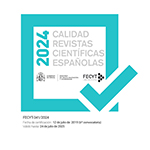Città, periferia e provincia nella narrativa romana di Alberto Moravia
Resumen
L’articolo si concentra sulla fase romana della narrativa di Alberto Moravia (La romana, La ciociara, i Racconti romani e i Nuovi racconti romani), esaminando il ruolo e il significato che in essa assume la dialettica città-periferia e città-provincia, specchio di quella più generale fra centro e periferia. La connotazione geografica di questa narrativa, che esplicitamente ne mette al centro fin dai titoli la romanità, rischia di relegarla a un’ottica locale e ristretta, offuscando così la presenza di temi e questioni centrali anche nel resto della produzione moraviana. Tale dialettica si intreccia, inoltre, con il «mito proletario», da cui per sua stessa ammissione lo scrittore fu suggestionato nel primo dopoguerra, ma che non gli impedì di rivolgere uno sguardo disincantato anche sui personaggi popolari e sul loro «mondo morale».
Descargas
Descarga artículo
Licencia
La revista Cuadernos de Filología Italiana, para fomentar el intercambio global del conocimiento, facilita el acceso sin restricciones a sus contenidos desde el momento de su publicación en la presente edición electrónica, y por eso es una revista de acceso abierto. Los originales publicados en esta revista son propiedad de la Universidad Complutense de Madrid y es obligatorio citar su procedencia en cualquier reproducción total o parcial. Todos los contenidos se distribuyen bajo una licencia de uso y distribución Creative Commons Reconocimiento 4.0 (CC BY 4.0). Esta circunstancia ha de hacerse constar expresamente de esta forma cuando sea necesario. Puede consultar la versión informativa y el texto legal de la licencia.










